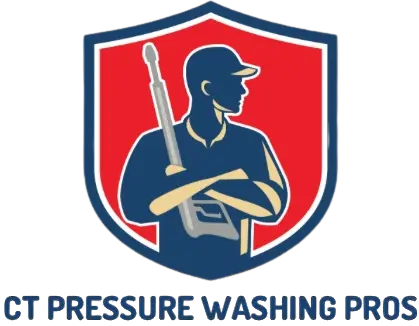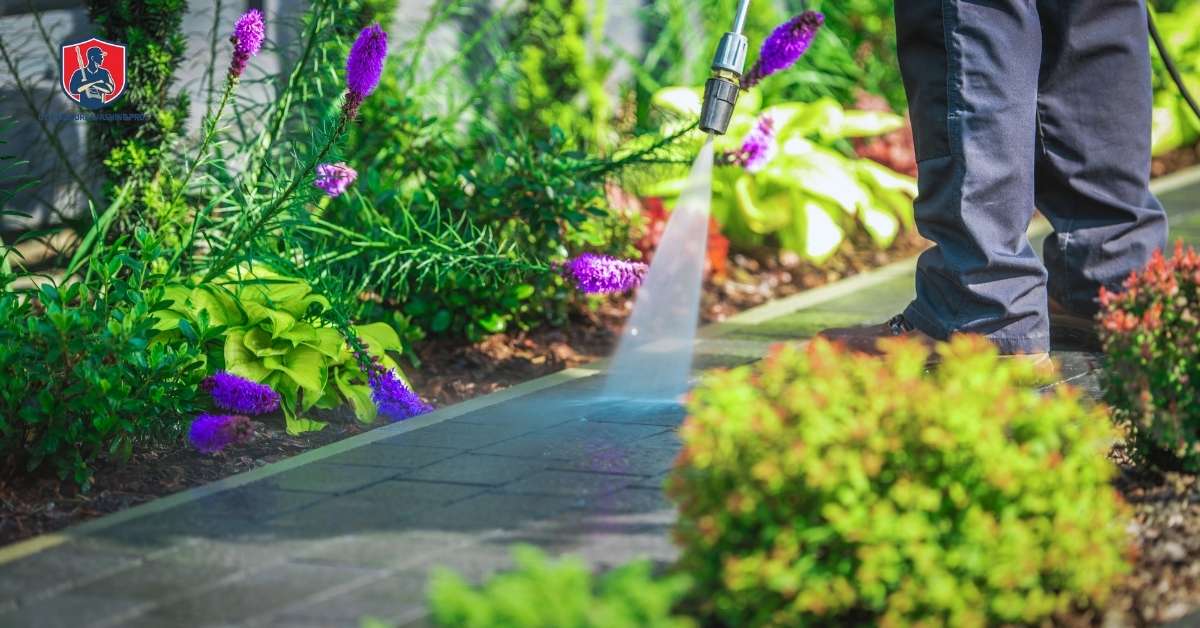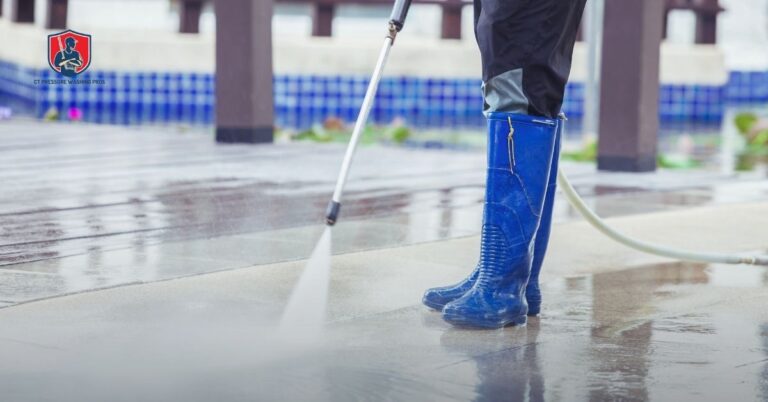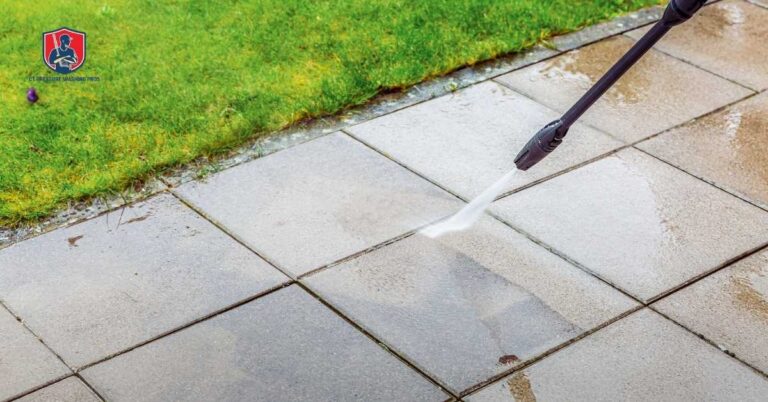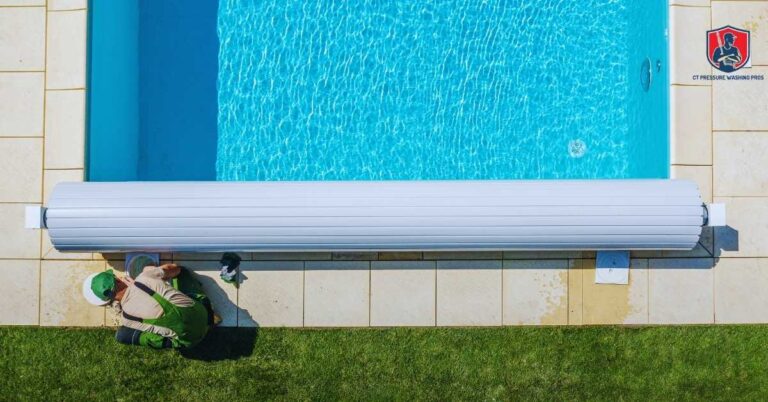Pressure washing makes homes and businesses look fresh again, but the dirty water running off your driveway or siding doesn’t just disappear. It often carries soap, dirt, and chemicals straight into storm drains—and eventually into rivers and lakes. That’s why Connecticut has clear rules regarding the handling of pressure washing runoff.
Ignoring these regulations can lead to fines, damage the environment, and even hurt your reputation if you’re a contractor. But following the rules isn’t as hard as it sounds. With the right approach, you can stay compliant, protect local waterways, and maintain the appearance of your property or business.
Next, let’s break down exactly what these regulations are, who enforces them, and how you can handle runoff safely without overcomplicating the process.
Table of Contents
Understanding Pressure Washing Runoff
Think about what happens after you wash your car or clean your driveway. The water doesn’t just sit there—it runs off, carrying dirt, soap, and sometimes chemicals along with it. That leftover water is what we call pressure washing runoff.
Here’s the thing: most storm drains don’t filter or treat anything. So when runoff heads their way, everything in that water—oil stains, detergents, paint chips—often ends up in nearby rivers or lakes.
It’s easy to overlook, right? You spray, clean, and move on. But picture it: the water from your driveway could be the same water someone downstream fishes in or a family uses for swimming. Suddenly, what seemed like “just water” isn’t so harmless anymore.
That’s why Connecticut has clear rules about handling runoff properly. Next, let’s look at why those rules exist and what they actually protect.
Why Runoff Regulations Exist in Connecticut
Runoff might look like harmless water, but it often carries far more than dirt. Think of everything left on a driveway or building—oil drips from cars, paint flakes, cleaning soap, and even tiny bits of metal. When pressure washing sends all that into storm drains, it doesn’t just disappear. It flows straight into rivers, lakes, and sometimes even public water supplies.
Connecticut takes this seriously because polluted water doesn’t just hurt fish and plants. It affects drinking water quality, damages local ecosystems, and can even make swimming areas unsafe. The goal isn’t to make cleaning harder—it’s to stop chemicals and waste from building up where they shouldn’t.
So, the rules are there to protect people, wildlife, and waterways all at once. And understanding them is the first step to staying compliant while keeping your property clean.
Next, we’ll break down who sets these rules and what laws actually apply in Connecticut.
Key Environmental Laws & Agencies in Connecticut
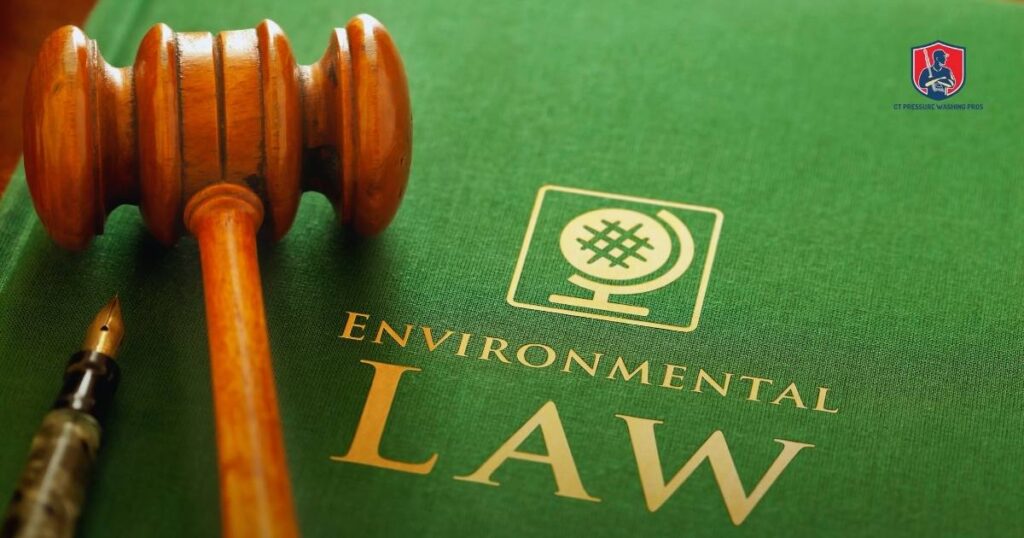
Before you can follow the rules, you need to know who sets them and what they cover. In Connecticut, two main levels of authority oversee pressure washing runoff:
Federal vs. State Regulations
At the national level, the Environmental Protection Agency (EPA) sets broad water quality standards under the Clean Water Act. These rules apply across the country and focus on keeping harmful pollutants out of public waterways.
Connecticut takes those federal standards and enforces them locally through the Connecticut Department of Energy and Environmental Protection (DEEP). This agency handles everything from stormwater permits to runoff enforcement, making sure businesses and homeowners follow state-specific guidelines.
Major Laws Affecting Pressure Washing Runoff
Here are the key regulations you need to know:
- Clean Water Act (CWA): Federal law prohibiting the discharge of pollutants into U.S. waters without a permit.
- Connecticut Stormwater Management Rules: State laws detailing how wastewater from activities like pressure washing must be collected, treated, or disposed of safely.
- Municipal Ordinances: Some towns add extra rules for local storm drains, so it’s smart to check with your city or county offices before starting big cleaning jobs.
Next, we’ll cover the specific requirements you must follow to stay compliant and avoid fines.
Runoff Compliance Requirements for Pressure Washing
Connecticut doesn’t leave much room for guesswork. If you pressure wash at home or run a cleaning business, there are specific rules to keep you on the right side of the law. Here’s what you need to know:
Permits & Authorization
- When a Permit Is Needed: Small, one-time residential projects usually don’t require permits. But large commercial jobs, especially those involving detergents or industrial sites, may need authorization under Connecticut’s stormwater rules.
- How to Check: The Connecticut DEEP website explains permit requirements clearly, or you can call your local environmental office before starting work.
Approved Water Disposal Methods
- Never Discharge to Storm Drains: Storm drains lead directly to rivers and lakes. That’s why untreated runoff can’t go there under any circumstances.
- Use Sanitary Sewer Systems: If available, directing water to a sanitary sewer ensures it reaches a treatment plant before release.
- On-Site Collection Systems: For areas without sewer access, portable water recovery units or containment systems keep runoff from spreading.
Choosing the Right Cleaning Agents
- Biodegradable Detergents: These break down naturally and reduce environmental harm.
- Follow Manufacturer Guidelines: Even eco-friendly soaps must be used properly to stay within compliance rules.
Next, we’ll go over best practices that make staying compliant easier—and often cheaper—than dealing with violations later.
Best Management Practices (BMPs) for Contractors & Homeowners
Following the rules doesn’t have to be complicated. A few smart steps before, during, and after pressure washing can keep you compliant and protect local waterways at the same time.
Pre-Cleaning Preparations
- Sweep Before You Wash: Clear leaves, dirt, and debris first. This keeps unnecessary waste out of the water and reduces how much ends up in runoff.
- Cover Storm Drains: Simple drain covers or filter mats stop dirty water from going straight into the system.
On-Site Filtration & Recovery Systems
- Use Portable Recovery Units: These collect and hold wastewater so it can be disposed of properly later.
- Sediment Filters and Oil/Water Separators: These devices help remove grease, sand, and other pollutants before water leaves the site.
Spill Prevention & Emergency Response
- Keep Cleanup Materials Ready: Absorbent pads or sandbags can contain accidental spills fast.
- Know Who to Call: If a major spill happens, contact the Connecticut DEEP spill response line right away to avoid bigger problems.
Next, we’ll explain what happens if you skip these steps and the penalties you could face for non-compliance.
Penalties for Non-Compliance
Skipping Connecticut’s runoff rules isn’t just bad for the environment—it can hit your wallet hard. Regulators take water pollution seriously, and fines can add up fast if you don’t follow the law.
Common Violations
- Letting dirty water flow into storm drains without treatment.
- Using harsh chemicals and dumping the wastewater on the ground.
- Running commercial pressure washing jobs without the right permits.
Fines and Legal Consequences
- Financial Penalties: Fines can range from a few hundred dollars for minor residential issues to thousands for commercial violations.
- Cleanup Costs: If your runoff contaminates local water, you could be charged for cleanup expenses.
- Legal Action: Repeat or serious offenders may face lawsuits or enforcement orders from the Connecticut DEEP or even federal agencies.
Simply put, prevention is far cheaper than paying for fines, cleanup, or legal fees later.
Next, let’s look at eco-friendly alternatives and sustainable practices that make staying compliant easier while helping the environment.
Eco-Friendly Alternatives & Sustainable Practices
Staying compliant doesn’t mean giving up on effective cleaning. Connecticut encourages practices that keep properties looking good while protecting the environment.
Water Recycling Systems
- Closed-Loop Systems: These capture, filter, and reuse the same water for multiple cleaning cycles.
- Lower Water Bills: Recycling cuts down on both water waste and costs, especially for commercial jobs.
Low-Pressure & Steam Cleaning Options
- Less Water, Same Results: Steam cleaning uses less water and fewer chemicals while still removing tough grime.
- Safe for Surfaces: Lower pressure helps prevent damage to siding, roofs, and concrete.
Community Clean-Up Programs
- Partner with Local Groups: Some Connecticut towns run eco-friendly cleaning and storm drain stenciling programs.
- Public Awareness: These efforts reduce pollution and show customers you care about the environment.
Next, we’ll share simple tips to stay compliant year-round so runoff problems never catch you off guard.
Tips for Staying Compliant Year-Round
Here are five simple ways to stay on top of Connecticut’s runoff rules all year:
- Plan seasonal cleanings: Handle leaves in fall, winter salt in spring, and routine washings before buildup gets heavy.
- Use eco-friendly cleaners: Choose biodegradable soaps to cut down on harmful chemicals in runoff.
- Keep records for big jobs: Note dates, locations, and disposal methods to stay organized and meet permit requirements.
- Train your crew or helpers: Make sure anyone handling equipment knows the rules and follows best practices.
- Check for local updates: Town or state rules can change, so review them before major cleaning projects.
Resources for Connecticut Property Owners & Contractors
Finding the right information quickly can save you time and help you stay compliant. Here are a few places to start:
- Connecticut DEEP Stormwater Program: CT DEEP Stormwater Management – Guidelines, permits, and contact information for state regulations.
- EPA Stormwater Program: EPA Stormwater Program – Federal rules under the Clean Water Act.
- Local Environmental Offices: Town or county departments can explain any extra local requirements.
- Storm Drain Marking Programs: Many Connecticut towns run volunteer programs to label drains and raise public awareness.
- Commercial Contractor Associations: Groups like PWNA (Power Washers of North America) often share compliance tips and best practices.
Conclusion
Pressure washing runoff rules in Connecticut aren’t there to make life harder—they’re a chance to work smarter. The best contractors and property owners use these regulations as a guide to build cleaner, safer, and even more cost-efficient practices.
If you handle jobs regularly, think beyond today’s project. Invest in water recovery systems, train your crew, and keep simple records. It doesn’t just prevent fines—it helps you market your business as environmentally responsible, which customers notice and appreciate.
For homeowners, staying ahead of seasonal maintenance avoids expensive surprises later. A few small steps, like using biodegradable cleaners and checking local rules before you start, can make a big difference for your property and your community’s water quality.
Compliance isn’t the finish line—it’s the baseline. Once you have it handled, you can focus on better equipment, better cleaning methods, and better results, knowing you’re protecting both your investment and the environment.
